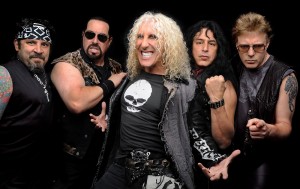Musical Fads Come and Go, But Rock Withstands Decades: Jay Jay French Talks about Respecting One’s Fans and the Fads of Today’s Music Industry
In the 21st century’s instantaneous world of social networks, fads can come and go within a single afternoon. The same applies to celebrity; no matter what your claim to fame, no one is safe from the capriciousness of today’s cultural climate. The music industry, in particular, has become more and more permutable, proven through Korean singer Psy’s rapid rise to international stardom after garnering over one billion views on YouTube in under two months. But will songs like “Gangnam Style” and “Call Me Maybe” withstand the next wave of fads, or will they be swept along and forgotten?
Music hasn’t always been like this. Guitarist Jay Jay French of Twisted Sister perhaps knows this better than anybody; nearly 40 years have passed since French first founded the band, yet people around the world still pack arenas to pump their fists to the legendary anthem, “We’re Not Gonna Take It”.
“We were a hard-working, all-American, roll-up-your-shirtsleeves and do it band,” French said, “except we dress like women.”
Talking to French for even a few minutes gives you an idea why Twisted Sister became so successful: his visionary mindset combined with a tireless work ethic (tellingly, he has completed two New York Marathons) make French a natural entrepreneur. Twisted Sister has gone through a number of musical directions and personnel changes — some of them not ending well — but French has kept the band on its feet, riding the upheaval and change as necessary steps to take in the bigger scheme of things.
French generously offered to talk with GALO about his thoughts on the contemporary music industry and what it really means to “party like a rock star.”
GALO: One of the most interesting aspects of Twisted Sister is how it is constantly evolving and being reinvented. Over the past 40 years, there have been 11 versions of the band that include changing names, band members and musical direction. Was reinvention essential for Twisted Sister’s survival?
Jay Jay French: I don’t know any band — ACDC, Judas Priest, Alice Cooper — that have been around for 40 years that have not gone through their personnel changes or direction. I don’t think any of us thought it would last more than two years, or three years, or five years. You start off with this thing — you’re 20-years-old — and you go, “Hey man, I’ll be famous in five years and then I’ll retire.” You have no idea what you’re really thinking. If you think about it, me, Dee [Snider] and Eddie [Ojeda], the core, have been standing shoulder to shoulder for 38 years — that’s a long time! Yes, there were breaks in-between. Yes, there were reinventions and reassembles and all sorts of stuff, but 38 years is an incredibly long time. I swear to you, I don’t think I ever thought in 1975 when I asked Eddie to come in [to try out] that we’d still be talking about it in 2013. I don’t think any band did. You go through a lot of change, a lot of upheaval, and there’s no way of knowing back in the beginning what you were really getting into. It’s astonishing to me that we’re one of the survivors.
GALO: In an interview for the Extreme Leadership Summit, you said that the only rock stars that have lasted are the ones who have really worked hard at it. Do you see yourself as one of those people?
JJF: The bottom line is that everyone is working really hard. A promoter hires you to entertain 80,000 people. Well, you can’t suck if you’re going to entertain 80,000 people. I mean, you really can’t suck. You better be good. How many bands are there that can entertain 80,000 people in this world? There are maybe 20? Maybe 30, tops? It’s a lot of work. If it was easy, everybody would be successful with a band that lasts 40 years.
GALO: In many ways, the music industry is now at a crucial turning point where musicians no longer have to sign with a label to make it big, using YouTube or their Web site to market their work. Where do you see the music industry going in the future?
JJF: You only really succeed by social media, word of mouth and live shows. There’s no record business. As time goes on, a pattern will start to emerge as to how bands do it. Think about Carly Rae Jepsen; she had a quarter of a million hits, blew the record out the door, and everybody thought that will never be touched again. Then Psy comes along and obliterates that.
The heavy rock music world is really splintered, and really soft if you look at the billboard charts. It’s going to be rough sledding for a while.
(Interview continued on next page)

